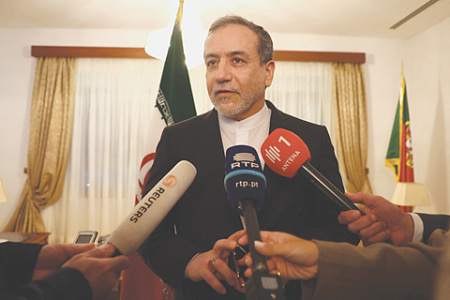
The United Arab Emirates (UAE) may host indirect talks between the United States and Iran, according to Middle Eastern media. It was Abu Dhabi that this month conveyed to Tehran a message from US President Donald Trump calling for dialogue on the nuclear program and other issues. The Islamic Republic was given two months to conclude the agreement. Israel, Iran’s opponent in the region, does not believe a deal is likely. An Israeli delegation went to Washington to persuade the United States to adopt a military scenario.
Sources of the Amwaj media publication informed about the likelihood that the Emirates may host indirect negotiations between the United States and Iran. According to them, Abu Dhabi is “definitely interested” in hosting such meetings.
The Trump administration is showing the same interest, considering the UAE as an important mediator on the Iranian issue. According to the Amwaj media interlocutors, the practice of indirect negotiation process does not look as confusing as one might imagine at first glance.: The participants of the consultations from both sides gather in the same building, while the hosts of the negotiations shuttle between the two rooms to transmit information about the positions.
Iran’s willingness to initiate indirect negotiations was recently indicated by the country’s Foreign Minister Abbas Araghchi. “Our position on this issue is completely clear: Iran, under the policy of maximum pressure, under voiced threats, will not enter into direct negotiations with the United States until there are changes in the approach of the opposite side towards Iran and the Iranian people,” said the chief of Iranian diplomacy. “Given the politics and accusations that are being made every day, we will not enter into direct negotiations with the American side, but the way is open for indirect negotiations.”
It is possible that the Iranian side is leaving a window of negotiation opportunities due to the situation in its national economy. The Iranian rial updated its anti-record on March 25, falling to 1 million units per dollar. Active consultations are underway within the government on how crisis indicators can affect the protest potential of society, according to Reuters.
Speaking at a joint press conference with his Armenian counterpart Ararat Mirzoyan on March 25, Araghchi informed that Tehran is currently formulating its response to Trump’s message. “It will be handed over at the appropriate time and in a suitable form,” the chief of Iranian diplomacy said.
This month, Trump, through the mediation of the Emirates, sent a special letter to Iran’s supreme leader Ali Khamenei, calling for negotiations on the nuclear program and broader political issues. If the Islamic Republic refuses, the message said, then a violent scenario awaits it. At the same time, Trump gave Tehran a two-month deadline to reach an agreement. Separately, the American leader expressed his readiness for negotiations to be conducted confidentially, without unnecessary publicity.
Even the possibility of a compromise between Iran and the United States worries Israel. This week, the Jewish State sent a delegation to Washington to hold talks within the framework of the Strategic Advisory Group. “Our goal is to convey to Trump that there is a bomb ticking under Iran and that we are in a period when you can’t blink and take your eyes off the ball,” an Israeli source told Washington–based Al–Monitor. “We need to increase the pressure, and we cannot allow Iran to delay in order to gain time. He can use this for a quick nuclear breakthrough, after which it will be too late.”
The government of Prime Minister Benjamin Netanyahu wants to persuade the United States to approve a military scenario against Iran. Moreover, the Middle Eastern ally does not mind if Washington takes an active part in the operation. “We dream of Americans doing this job,– says one Al-Monitor source. – They are the only ones who are able to conduct a difficult, long and effective campaign at any distance. They have the right heavy bombers. They have an air umbrella and logistics infrastructure all over the world. They have aircraft carriers.” According to the source, the Americans do not even need to land ground forces – everything can be “done from the air and from the sea.”
A military scenario is being calculated by the United States, but only as a last resort. The White House talks very abstractly about the possible parameters of such an operation against Iran. “We do not need to resolve all issues by military means, but this does not mean that, having been forced to come to a certain point, we will not resort to military action, we do this under certain circumstances,” Stephen Witkoff, the US president’s special envoy for the Middle East, told Fox News. According to him, Trump’s position boils down to the fact that Iran should not have weapons of mass destruction. “We cannot allow them to start building a nuclear arsenal. This should not happen,” Witkoff explained.
Tehran is demonstrating by all means that it is not afraid of a potential attack from opponents. “Due to the fact that the level of training in the country is extremely high, even one hundred percent, I am sure that no one would even think of attacking our country, as everyone understands the consequences. Our armed forces, the Ministry of Emergency Situations, our government and the people’s forces are fully prepared, which creates immunity for us,” Araghchi said the other day.
